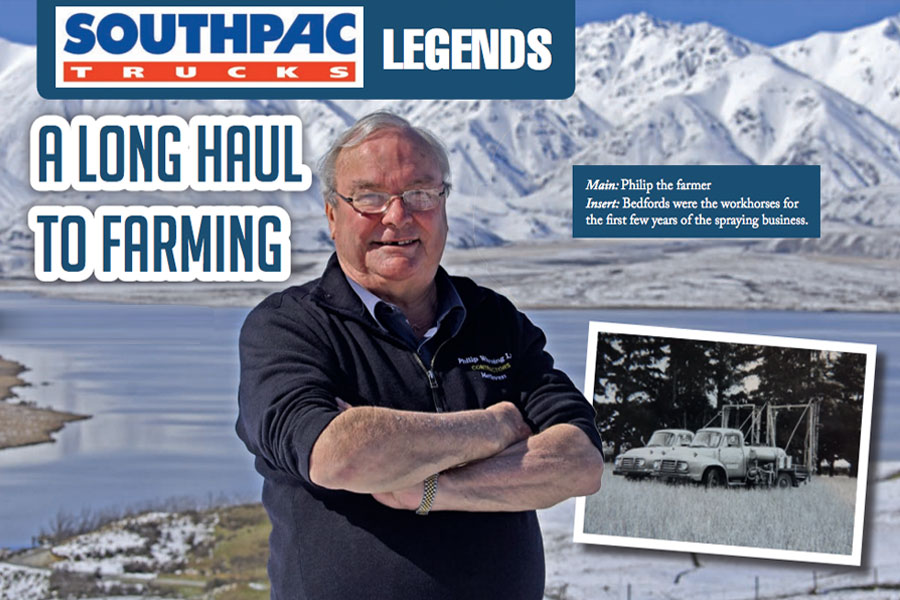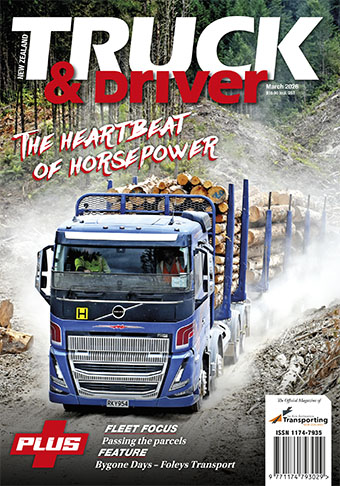Southpac Legends


A Long Haul to Farming - Philip Wareing
Southpac Legends
Philip Wareing sees himself as almost an accidental transport operator. He says it was just a stepping stone towards his primary goal of becoming a farmer, something he achieved around 30 years into his working life – but in the meantime that intermediate step has morphed into a significant player in the industry in Canterbury.
The Philip Wareing Ltd group now comprises five wholly-owned subsidiaries – the original PWL, based in the mid-Canterbury town of Methven, Wilson Bulk Transport in Tinwald, Rural Transport, which has headquarters in nearby Ashburton and branches in Fairlie, Kurow and Waimate, Greymouth’s Trans West Freighters, and container handling specialist NZ Express, which operates out of Christchurch.
The group’s activities cover all aspects of road transport – bulk, logging, containers, stock and freight as well as fertiliser spreading and horticulture cartage. Three cool stores handle an average of 12,000t of seed potatoes every year.
The ‘farmer’ goal was reached in 1997, when the Wareing family bought the 9000 hectare Mt Arrowsmith station, tucked between the Arrowsmith Range and Lake Heron beyond the Ashburton River gorge. At the time it supported 6000 stock units. This has more than doubled since. The farm runs merino sheep, Angus cattle and red deer. A previous shearers’ quarters has been expanded and redeveloped into a self-catering lodge, giving guests access to the mountain biking, walking, fishing and 4wd opportunities of the stunningly beautiful area.
In 1999 another high country station, Big Ben, joined Mt Arrowsmith in the Wareing portfolio. However, it has since been sold. As Philip puts it: “Two high country stations and two droughts was one too many of each, so we sold Big Ben.”
Covid-19 has put a dent in the farming operation’s profit, he adds: “Two years ago we were getting $35 a kg for the merino wool, whereas now it would probably be down as far as $13-14. In the world garment trade, everything high end has been affected for the time being.”
That hasn’t dimmed his enthusiasm for the high country: “The farm takes up as much time as I can give it. Any excuse, and I’m up there like a shot. However, I’m not full-time at it, we have permanent staff running it on a day-to-day basis.”
Given his love of farming, it comes as some surprise to find he wasn’t actually brought up on the land: “My father was the truck, tractor and car salesman for the Ford dealer in Rangiora, but through his contacts with local farmers I was able to get school holiday work with some of them and found I absolutely loved it. I knew it was what I wanted to do, and everything since has been aimed at that.”
...Philip Wareing sees himself as almost an accidental transport operator. He says it was just a stepping stone towards his primary goal of becoming a farmer, something he achieved around 30 years into his working life – but in the meantime that intermediate step has morphed into a significant player in the industry in Canterbury.
The Philip Wareing Ltd group now comprises five wholly-owned subsidiaries – the original PWL, based in the mid-Canterbury town of Methven, Wilson Bulk Transport in Tinwald, Rural Transport, which has headquarters in nearby Ashburton and branches in Fairlie, Kurow and Waimate, Greymouth’s Trans West Freighters, and container handling specialist NZ Express, which operates out of Christchurch.
The group’s activities cover all aspects of road transport – bulk, logging, containers, stock and freight as well as fertiliser spreading and horticulture cartage. Three cool stores handle an average of 12,000t of seed potatoes every year.
The ‘farmer’ goal was reached in 1997, when the Wareing family bought the 9000 hectare Mt Arrowsmith station, tucked between the Arrowsmith Range and Lake Heron beyond the Ashburton River gorge. At the time it supported 6000 stock units. This has more than doubled since. The farm runs merino sheep, Angus cattle and red deer. A previous shearers’ quarters has been expanded and redeveloped into a self-catering lodge, giving guests access to the mountain biking, walking, fishing and 4wd opportunities of the stunningly beautiful area.
In 1999 another high country station, Big Ben, joined Mt Arrowsmith in the Wareing portfolio. However, it has since been sold. As Philip puts it: “Two high country stations and two droughts was one too many of each, so we sold Big Ben.”
Covid-19 has put a dent in the farming operation’s profit, he adds: “Two years ago we were getting $35 a kg for the merino wool, whereas now it would probably be down as far as $13-14. In the world garment trade, everything high end has been affected for the time being.”
That hasn’t dimmed his enthusiasm for the high country: “The farm takes up as much time as I can give it. Any excuse, and I’m up there like a shot. However, I’m not full-time at it, we have permanent staff running it on a day-to-day basis.”
Given his love of farming, it comes as some surprise to find he wasn’t actually brought up on the land: “My father was the truck, tractor and car salesman for the Ford dealer in Rangiora, but through his contacts with local farmers I was able to get school holiday work with some of them and found I absolutely loved it. I knew it was what I wanted to do, and everything since has been aimed at that.”
Philip had toyed with attempting an agriculture degree at Lincoln College, but decided against it. As he explains: “A lot of my mates had gone there who were brighter than me, and were failing, so I figured I would struggle as well. So I joined Pyne Gould Guinness and in time became a grain agent, operating for some years from Rakaia and in 1974 moving to Methven with my wife Wendy.
However, it was not a matter a settling back into a safe career. He was always on the lookout for an opportunity, and one soon presented itself in the form of a small agricultural spraying business that was for sale locally.
The business was based on a single truck, a Bedford J1, and Philip ran it alone (“Working daylight to dark every day,” he recalls) for a couple of years before buying another truck and employing a local man, Paul Connell, who had been working in an engineering shop but was looking for something different. Forty-three years on, Paul is still with Wareings, and still an integral member of the team.
The next acquisition – a lime spreading business – was not long after, in 1981...with some prompting from the vendor. Four trucks, a Dodge, a Commer and a couple of J1 Bedfords came with the deal.
Meanwhile, the original J1s from the spraying business had been replaced by a pair of new ones, but with their factory six-cylinder engines swapped for Holden 308 V8s by Smallbone Motors in Ashburton. “The V8s slotted in perfectly with very little modification,” recalls Philip. “We called them the fastest Bedfords in the West!”
Grunty V8s were very much the vehicle of choice for a while, with the spraying fleet having been upgraded to Ford F250s. That came to an abrupt end with spiralling fuel costs, he says: “I remember we had a job quite a distance away, on a farm down near the coast. One day we used one of the petrol F250s, and the next day a little Isuzu diesel that had been added to the fleet. The difference in fuel costs was around $100!”
During those early years Philip became friendly with, and was guided by, Tinwald transport operator Trevor Wilson. Wilson died of cancer in 1991, but had expressed a wish that his company carry on as a charitable trust. One was set up with Philip as chairman. Over the years the trust has disbursed $6 million to Presbyterian Support and St John’s Ambulance, Wilson’s nominated charities. In 2018 Wareings bought the operational assets of Wilson Bulk Transport, with the trust still owning the buildings.
Wareings was a founding shareholder in Rural Transport, set up in 2004 after Owens closed its rural transport arm, and has subsequently bought out the other partners. NZ Express and Trans West were bought in 2006 and 2011 respectively.
Since arriving in Methven 46 years ago, the Wareings have worked tirelessly for the community. Philip was chairman of the community board for two terms, and was awarded membership of the NZ Order of Merit for his services to the town.
He has also been active for many years in trucking association affairs, and was chairman of the Ashburton branch of the RTA Region 4 until it was amalgamated with Christchurch.
Though showing little signs of easing up on a multitude of business and farming interests, he has happily turned over executive control of the company to a new generation. Elder son Mark is general manager of Rural, his brother Simon manages Wareing’s Transport, while their sister Rachel is Group HR manager.
Philip sees tight labour as the ongoing challenge facing the transport industry, but is still confident of its future: “I think it’s the same as it has always been, you sit around and have a few beers with your competitors, but the next day you’re out battling for the work that’s on offer. And that’s not such a bad thing.”
Looking back, he has only a couple of (quite mild) regrets: “I always wanted to be an All Black, (I played on the wing for Canterbury Country through the age grades) and to learn to fly, but didn’t make either.”



 + EQUIPMENT GUIDE - FREE
+ EQUIPMENT GUIDE - FREE
